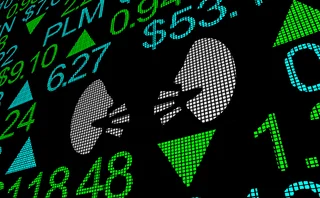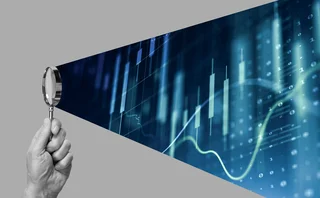Electronic-Level Events
The phasing-out of fixed-income dinosaurs is underway, but is it a good thing?

Blink and you might have missed it. On October 15, 10-year US treasuries saw their own Flash Crash-or T-bill crash. It's a worrying sign in a market that's hardly been outperforming its own historic values over the past few years, and although swap execution facilities (SEFs) were quick to point out that October 15 had record volumes, none of it inspires confidence.
It's the icing on the cake over a furious period of interest in turning fixed-income trading electronic in nature. The benefits of this are clear to many, who cite increased transparency as well as lower costs, greater liquidity and a number of other factors which are touched upon in Marina Daras' feature. As electronic is inevitable, the sooner archaic asset classes such as fixed income embrace it, the better.
The real picture isn't so clear, though. With the advent of SEFs and the proliferation of electronic bond trading that had occurred for years before that, much of fixed income trades electronically already. Yes, shifting more onto these platforms may allow for more volume through advanced electronic methods of execution such as algorithmic trading, but it's important to differentiate between volume and liquidity.
Secondly, there's an element of resistance by the industry itself. Many fixed-income sales traders, particularly those who work for boutique brokerages, are employed on a commission rather than a salary basis, and the last few years have not been easy for them. Volatility is at an all-time low, and making commissions based on spreads has become harder than ever-indeed, some traders I have spoken to recently have not seen a proper pay check for a number of months now. Introducing fully electronic methods of execution may please the vendors and the flow monsters, but what about the individual sales trader on the ground? It might be their death knell, given electronic execution's tendency to lower costs, trade sizes and ultimately, commissions.
Natural Evolution
The market is ultimately based on Darwinism, though, I hear you say. Surely these fixed-income dinosaurs have to adjust to the new normal of market conditions, just like the floor traders at the NYSE had to during the 1990s and the 2000s? Perhaps they do. Everyone's job is changing thanks to electronic means now, from factory workers and check-out staff at Walmart through to business journalists and investment bankers. Nobody is immune. But there's a loss of experience, knowledge and temperament that is potentially at risk with the blind march toward electronic markets, not to mention the risks of the medium itself.
Yes, shifting more onto these platforms may allow for more volume through advanced electronic methods of execution such as algorithmic trading, but it's important to differentiate between volume and liquidity.
For instance, while SEFs appear to have weathered the T-bill crash well, their volumes aren't what they once were, and there are lingering problems with rulebooks and other areas that have prevented significant sections of the market from engaging. Likewise, if this is what happens to instruments that already trade in a highly electronic manner, imagine what happens on a market that doesn't have the kind of safeguards that an exchange does, yet trades broadly electronically. In terms of what the future holds, it's algorithmic trading and periodic, mini flash-crashes, if it's not thought out and constructed properly.
But arguments on the pro side are hard to counter. Fixed income desperately needs a mechanism by which the larger buy-side firms can perhaps step into the roles vacated by the investment banks as market-making firms, and lowering the cost of business via going electronic is the most obvious way to do that. Likewise, more transparency is sorely needed, and the regulators also desperately need more information about what goes on, assuming they figure out how to do anything with it. But while it is important to evolve, it's also worth remembering that going electronic for the sake of it is not the answer to all of life's problems. Just ask the equity markets.
Anyone interested in hearing more on the march to electronic trading in fixed income can check out a free webcast we're hosting on November 12, featuring speakers from Equinix, Nasdaq, Tradeweb, Société Générale and more.
A version of this article appears in the November issue of Waters magazine.
Only users who have a paid subscription or are part of a corporate subscription are able to print or copy content.
To access these options, along with all other subscription benefits, please contact info@waterstechnology.com or view our subscription options here: http://subscriptions.waterstechnology.com/subscribe
You are currently unable to print this content. Please contact info@waterstechnology.com to find out more.
You are currently unable to copy this content. Please contact info@waterstechnology.com to find out more.
Copyright Infopro Digital Limited. All rights reserved.
As outlined in our terms and conditions, https://www.infopro-digital.com/terms-and-conditions/subscriptions/ (point 2.4), printing is limited to a single copy.
If you would like to purchase additional rights please email info@waterstechnology.com
Copyright Infopro Digital Limited. All rights reserved.
You may share this content using our article tools. As outlined in our terms and conditions, https://www.infopro-digital.com/terms-and-conditions/subscriptions/ (clause 2.4), an Authorised User may only make one copy of the materials for their own personal use. You must also comply with the restrictions in clause 2.5.
If you would like to purchase additional rights please email info@waterstechnology.com
More on Trading Tech
Artificial intelligence, like a CDO, needs to learn from its mistakes
The IMD Wrap: The value of good data professionals isn’t how many things they’ve got right, says Max Bowie, but how many things they got wrong and then fixed.
Symphony looks to cloud, AI for enhanced trader voice
The communication and collaboration platform provider is utilizing modern technology to grow its network of services and users.
Observations and lessons to learn from the move to T+1
The next few years will see other jurisdictions around the world look to North America for guidance on transitioning to shorter settlement cycles.
As US options market continued its inexorable climb, ‘plumbing’ issues persisted
Capacity concerns have lingered in the options market, but progress was made in 2024.
Doubts raised over new FX platform disclosures
New disclosure sheet template will require platforms to outline how they charge for data
Expanded oversight for tech or a rollback? 2025 set to be big for regulators
From GenAI oversight to DORA and the CAT to off-channel communication, the last 12 months set the stage for larger regulatory conversations in 2025.
DORA flood pitches banks against vendors
Firms ask vendors for late addendums sometimes unrelated to resiliency, requiring renegotiation
IPC’s C-suite shuffle signals bigger changes for trader voice tech
Waters Wrap: After a series of personnel changes at the legacy provider, WatersTechnology examines what these moves might mean for the future of turrets and trader voice.







